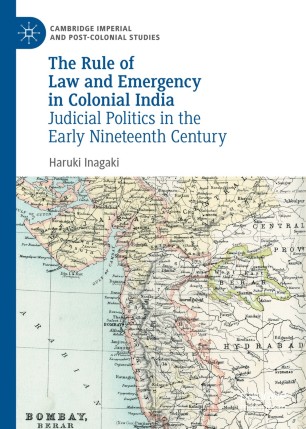Here is a fuller description, including the TOC, of the previously noted essay collection, American Legal Education Abroad: Critical Histories, edited by Susan Bartie and David Sandomierski (New York University Press:
The second half of the twentieth century witnessed the export of American power-both hard and soft-throughout the world. What role did US cultural and economic imperialism play in legal education? American Legal Education Abroad offers an unprecedented and surprising picture of the history of legal education in thirteen countries beyond the United States. Each study in this book represents a critical history of the Americanization of legal education, re-examining prevailing narratives of exportation, transplantation, and imperialism. Collectively, these studies challenge the conventional wisdom that American ideas and practices have dominated globally. American Legal Education Abroad begins with a foundational history by leading Harvard Law School historian Bruce Kimball, who explains the factors that created a transportable American legal model, and the book concludes with reflections from Susan Carle and Bob Gordon, whose observations on recent disruptions within US law schools suggest that their influence within the global order of legal education may soon fall into further decline.
This book should be considered an invaluable resource for anyone in the fields of law, legal history, socio-legal studies, law and society, legal education, comparative law, colonial and postcolonial legal studies, globalisation and law, and intellectual and cultural history.
Table of Contents
Introduction
Part 1: Foundation Stories
1. The Proliferation and Transformation of Harvard's Case Method in the United States, 1870s-1990s. Bruce A. Kimball
2. How America Did (and Didn't) Influence English Legal Education, circa 1870-1965. David Sugarman
Part 2: Americanization-Critical Histories
3. American Influences, Canadian Realities: How "American" Is Canadian Legal Education? Philip Girard
4. Functionalism, Legal Process, and the Transformation (and Subordination) of Australian Law Schools. Susan Bartie
5. Conservatives, Nationalists, and American Romantics Debating Legal Education in Kwame Nkrumah's Ghana. John Harrington and Ambreena Manji
6. Transplantation and Domestication of American Models of Legal Education in Nigeria. J. Jarpa Dawuni and Rebecca Emiene Badejogbin
7. Model, System, or Node? Understanding Legal Education Reform in Twentieth-century China and Beyond. Jedidiah J. Kroncke
8. Transplants in Estonian Legal Education: Influences from the US Legal System. Irene Kull, Merike Ristikivi, and Aleksei Kelli
9. "The Turn to the West": American Legal Education and Educational Reforms in the Swedish Welfare State, 1950-2000. Kjell Å Modéer
10. The American Case Method and New Japanese Legal Education. Yoshiharu Matsuura
11. Legal Education in France Turns Its Attention to the Harvard Model. Jean-Louis Halpérin
12. American Moment(s): When, How, and Why Did Israeli Law Faculties Come to Resemble Elite US Law Schools? Pnina Lahav
13. Catalytic Agents? Lon Fuller, James Milner, and the Lawyer as Social Architect, 1950-1969. David Sandomierski
14. Legal Teaching and the Reconceptualizing of the State: Global Law and New Legal Education Loci. José Garcez Ghirardi
15. Socratic Method, Philippine-style: To Unhave or Uphold? Emily Sanchez Salcedo
Part 3: US Perspectives
16. Rethinking Assumptions about the Global Influence of US Legal Education. Susan D. Carle
17. The Harvard Models in Their Native Habitat and Abroad: Reflections. Robert W. Gordon
The Contributors
Rebecca Emiene Badejogbin, Director of Academics, Council of Legal Education, Nigerian Law School.
Susan Bartie, Senior Lecturer in Law, University of Tasmania.
Susan D. Carle, Professor of Law, American University Washington College of Law.
J. Jarpa Dawuni, Associate Professor of Political Science, Howard University, Washington, DC, and Executive Director, Institute for African Women in Law.
José Garcez Ghirardi, Associate Professor, FGV SP Law School, Brazil.
Philip Girard, Professor, Osgoode Hall Law School, Toronto.
Robert W. Gordon, Professor of Law, Stanford University, and Chancellor Kent Professor of Law & Legal History, Emeritus, at Yale University.
Jean-Louis Halpérin, Professor (exceptional class), École Normale Supérieure, Paris and Director of the Unité mixte de recherche 7074-Centre for Legal Theory and Analysis (CNRS-University Paris X-ENS and EHESS).
John Harrington, Professor of Global Health Law and Director of the Centre for Law and Global Justice, Cardiff University and Director of the ESRC Doctoral Training Programme in Wales.
Aleksei Kelli, Professor of Intellectual Property Law, Faculty of Law, University of Tartu, Estonia.
Bruce A. Kimball, Professor in Philosophy and History of Education, The Ohio State University.
Jedidiah J. Kroncke, Associate Professor of Law, University of Hong Kong.
Irene Kul, Professor of Civil Law and Head of the Department of the Civil Law, University of Tartu, Estonia.
Pnina Lahav, Professor, Boston University School of Law.
Ambreena Manji, Professor of Land Law and Development, Cardiff University.
Yoshiharu Matsuura, Professor Emeritus and Designated Professor for a special graduate program, Nagoya University Graduate School of Law.
Kjell Å Modéer, Professor Emeritus of Legal History, Lund University, Sweden.
Merike Ristikivi, Associate Professor of Legal History in the Faculty of Law, University of Tartu, Estonia.
Emily Sanchez Salcedo, Teacher, Commercial Law Department, De La Salle University in the Philippines.
David Sandomierski, Assistant Professor, Faculty of Law, Western University in London, Ontario.
David Sugarman, Professor Emeritus of Law, Lancaster University Law School; Senior Associate Research Fellow, Institute of Advanced Legal Studies, University of London; and Senior Associate, Centre for Socio-Legal Studies, University of Oxford.












